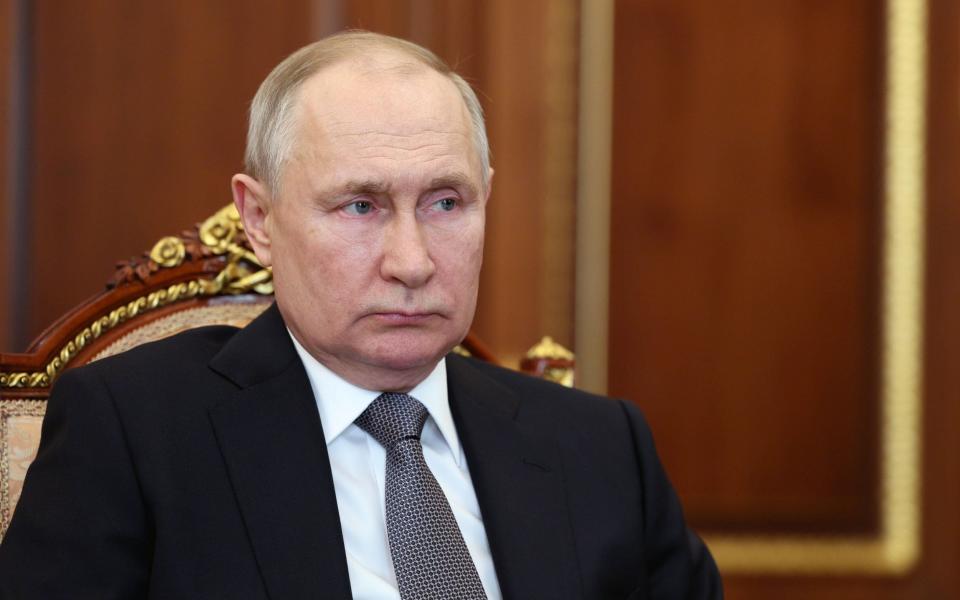
Russia has warned Europe that it faces a fresh gas crisis next winter as it scrambles to restock reserves as Vladimir Putin launches a new attempt to weaponise energy.
Gazprom, Russia’s state-owned gas supplier, said Europe had made it through winter despite cuts in Russian gas supplies owing to mild temperatures but warned there “is no guarantee that nature will make such a gift” again.
In a statement on Twitter, it said restocking for next winter would not be easy, blaming “politically motivated decisions aimed at halting the imports of Russian pipeline gas”.
Russia curbed pipeline gas supplies to Europe last year in retaliation for sanctions issued in the wake of its invasion of Ukraine.
The scramble to replace Russian gas with imports from around the world triggered a surge in prices and a major cost of living crisis that has cost Europe’s governments billions of euros.
However, Europe is now emerging from winter with gas stocks more than half full, close to record highs for the time of year.
That puts the continent in a stronger position to manage with less Russian gas, while it can also lean on imports of liquified natural gas (LNG) from elsewhere.
Russian pipeline flows to Europe are currently averaging about 67m cubic metres per day in April 2023, compared with around 281m cubic metres per day in April 2022, according to Alex Froley, senior LNG analyst at market experts ICIS.
The drop in exports has harmed Russia’s coffers, with revenues from oil and gas exports reportedly 40pc to 50pc lower in January and February compared to the same months a year earlier.
Mr Froley said: “Because industries and consumers cut their demand because of high prices, and it was a mild winter, Europe has a lot more gas in storage than you would have expected.
“So in most of our modelling, it should be pretty achievable for Europe to refill gas storage ahead of next winter.
“We don’t don’t expect any enormous price spikes this summer of the type that we saw last year.”
Story continues
However, he warned that cold weather next winter could yet push up demand and prices again.
“We should also note that even though prices have dropped from last year, they’re still around twice the long-term average of the last decade, and could remain elevated for some years to come,” he added.
The UK imported little gas from Russia directly before the war and has since banned imports. However, it is connected to the European market and prices in the UK closely track those on the continent.
Wholesale gas prices in Britain climbed as high as 500p per therm during the depth of the crisis last year. They have since fallen back to around 100p, more than double the long-term average of less than 50p.
Gas is used to generate more than a third of Britain’s electricity and heat the majority of its homes and businesses, meaning high gas prices have a significant effect on the economy.
National Gas, the owner of Britain’s gas transmission network, on Tuesday said it expected there to be “sufficient supplies” to meet demand this summer.
However, it warned that maintenance work on pipelines from Norway, Britain’s largest gas supplier, could affect deliveries to Britain over the period.
Cuts in pipeline gas supplies from Norway would leave Britain more reliant on LNG, although Mr Froley said he did not see this as a particular problem for the UK.
“Outages take place in summer, because demand is lower – there should be LNG,” he said. “So it is another factor, but it’s not a big problem.”
National Gas said it expected Britain would continue to act as a “transit” country for gas to Europe.
Over the past year, LNG destined for the continent from the US and elsewhere has first been processed in Britain, received at terminals in Milford Haven, Wales, converted back into gaseous form, and sent over to the continent via pipes from Bacton, Norfolk.
On Twitter, Gazprom warned the volume of gas available to Europe would be “greatly affected by competition for LNG”.
It added: “[The] replenishment of has reserves in storage facilities to the level of last year may become a non-trivial task for European companies.”
Tom Marzec-Manser, head of gas analytics at ICIS, said: “You sense Gazprom really would like Asian LNG demand to bounce back so it will impact more pain on the European natural gas market.”